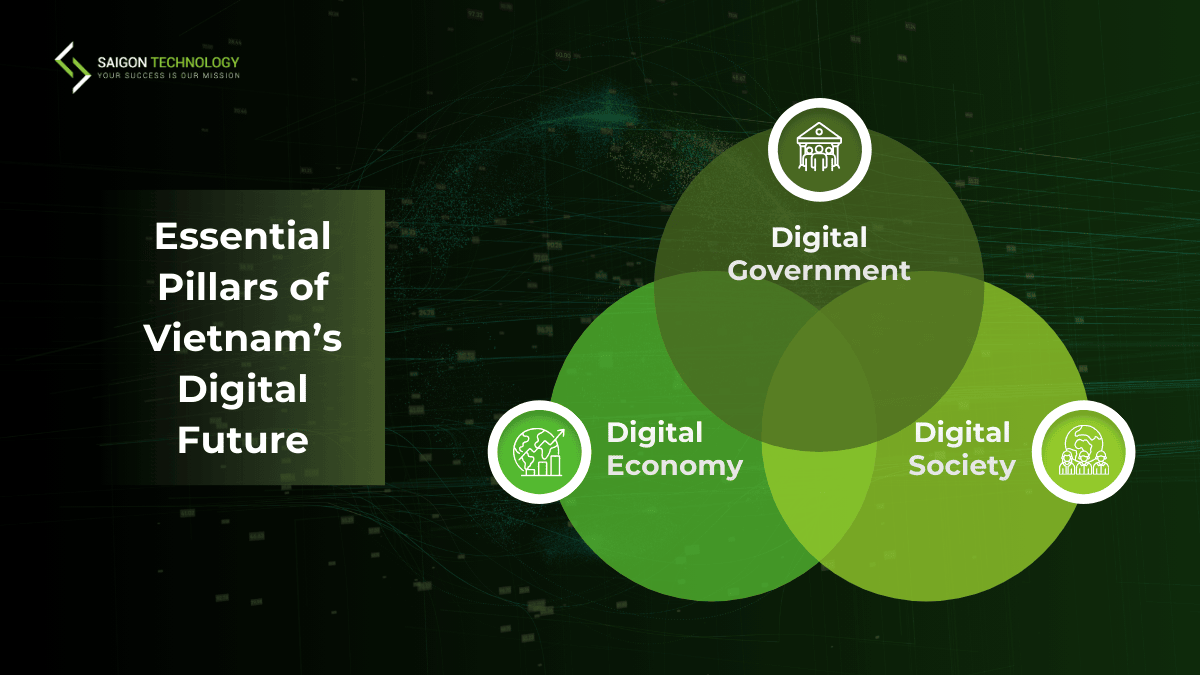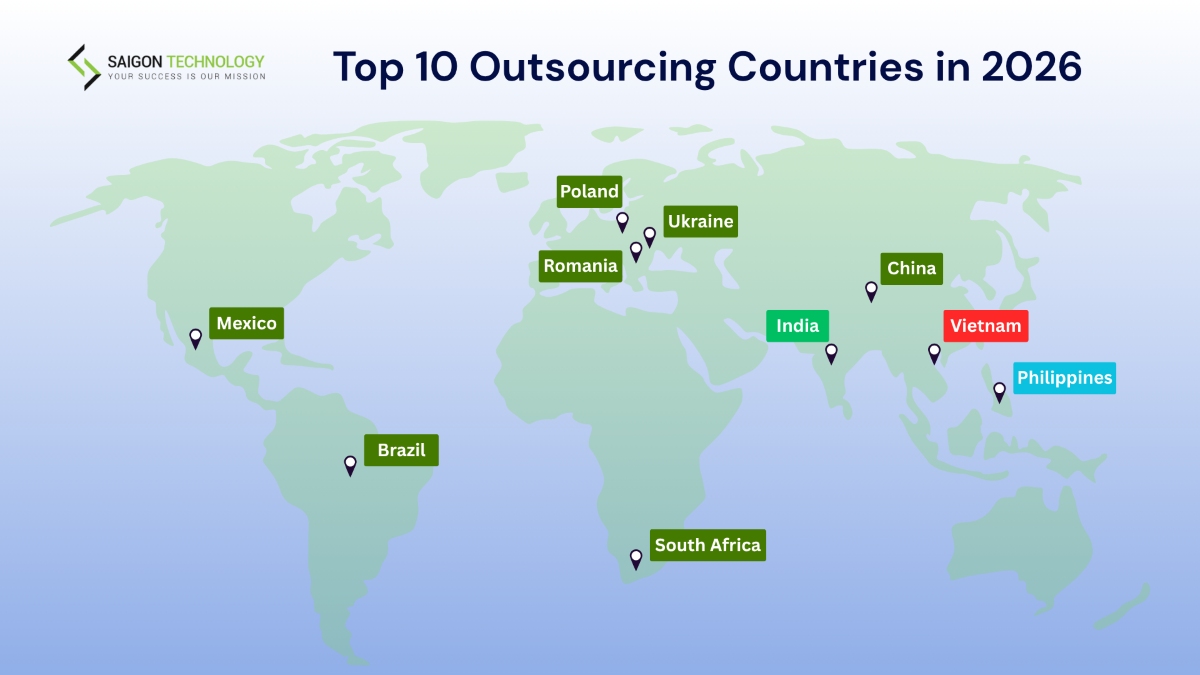Digital transformation in Vietnam matters now. This country drives one of the fastest-growing digital economy sectors in APAC. Its market may hit around $45B by 2025! Vietnam has become a winner due to US-China supply-chain shifts. Rapid adoption of banking apps, electronic payment accounts, e-commerce, smart cities, and online public services also shows the pace of change.
In this article, Saigon Technology gives you a clear view of Vietnam’s digital transformation progress. You also learn the opportunities, regulatory considerations, market risks, and clear steps for engagement. Keep reading to explore!
Overview of Vietnam’s Digital Transformation Landscape
Government priorities, tech workforce, and infrastructure are all important factors to think about when entering the Vietnamese market.
Government Priorities
By 2026, Vietnam’s National Digital Transformation Program continues to emphasize digital integration across three core pillars, including:
- Digital Government with strategies on VNeID, e-tax, and e-invoices
- Digital Economy aiming for 30% GDP by 2030
- Digital Society with digital inclusion and literacy programs
Vietnam’s technology transformation focuses on fields like fintech, healthcare, education, e-commerce, logistics, the energy sector, and public administration.
Market Drivers
Vietnam’s digital market is well-known for its young, tech-savvy workforce. Its engagement is equally remarkable. Over 70% of citizens are connected via smartphones and high-speed internet. We also want to mention the explosive growth of:
- Mobile payments (MoMo and ZaloPay)
- E-commerce (Shopee and TikTok Shop)
- Ride-hailing & online services (Grab and Gojek)
Also, Industry 4.0 is moving forward with AI, IoT, and automation, making entirely data-driven operations possible. Digital-based public–private partnerships serve as the most efficient strategy to attract FDI and regional investment.
Infrastructure & Technology Readiness
Vietnam is strengthening its digital foundation with:
- Nationwide broadband expansion
- Early-stage 5G rollout in major cities like Hanoi, Ho Chi Minh City, and Da Nang
- Rapid cloud adoption (Viettel Cloud, FPT, AWS, Google Cloud) across enterprises
- Growing data center ecosystem
- Improved cybersecurity frameworks
- Digital identity and national data integration through VNeID and Government Cloud
Strategic National Initiatives Fueling Vietnam’s Digital Transformation
Vietnam takes its transformation seriously through practical actions and digital maturity assessment. So let’s get back to the National Digital Transformation Program to see how it really works.
Digital Government
Vietnam’s digital transformation is accelerating e-governance through the National Public Service Portal and the VNeID identity system. This strategy also involves online tax and e-invoice services, alongside smart-city platforms. Together, those initiatives improve transparency and streamline public services nationwide.
Digital Economy Enablement
In Vietnam’s digital transformation phase, the government offers programs to support business digitalization, such as SME incentives and fintech sandboxes. Policies also focus on startup incubation via the NIC and efficient platform scaling.
Digital Society
As part of its effort to shape an inclusive and high-tech future, the country focuses on nationwide inclusion and literacy campaigns. The government also increased the availability of broadband and introduced 5G. The real feature here ensures that access is equal in urban and rural segments.
Why Vietnam Is Emerging as a Digital Transformation Hotspot?
Many global investors find partners in Vietnam due to its outstanding transformation. There are many driving forces behind the trend, such as:
Strategic Location in Southeast Asia
Located centrally in Southeast Asia, Vietnam easily accesses major markets, like Singapore, Thailand, and China. In addition, the GMT+7 works very well with APAC, EU, and some US time zones.
This location also benefits Vietnam’s digital transformation market, thanks to the strong logistics and supply-chain accessibility for regional operations. Thus, US companies like to establish ODCs, R&D hubs and multinational tech teams here
Competitive Labor Costs
Vietnam comes with lower labor and operational costs than regional high-cost markets, making it important for Vietnam’s digital transformation.
For example, Saigon Technology’s skilled engineering rates range from $28 to $46/hour. This way, global partners can save a lot of their software development in Vietnam.
The costs of R&D and cloud teams are affordable as well. While keeping the price low, its strong cost-to-skill ratio compared to Singapore, Malaysia, and India is another plus.
Talent & Outsourcing Advantages
Over 80,000 IT graduates with a strong STEM focus every year contribute to the large, young workforce here. Clients can easily find talent in modern stacks like web/mobile, AI/ML, cloud, DevOps, and microservices.
Plus, the experts are reliable and hardworking. Those in major cities have strong English skills. You also enjoy the stable business environment and low turnover. That’s why outsourcing in Vietnam is surging.
Economic Impact and Digital Growth Outlook
Vietnam’s digital economy, one of the fastest-growing in Southeast Asia, is expanding at over 20% annually. In 2024, the number of internet users in Vietnam was estimated to be around 78 million. Internet penetration was really high, too, at 79.1%, which makes for a great foundation for high-tech services.
More consumers and businesses are adopting fintech, e-commerce, and modern platforms. These changes support broader digital transformation strategy goals. This momentum is driving Vietnam’s rapid digital growth.
Investment Landscape — Why Vietnam Attracts Global Investors
World-leading tech groups, including Samsung, Intel, and LG, have committed enormous FDI into R&D and manufacturing expansion in Vietnam. Cloud mega-vendors, such as AWS and Google Cloud, scale dynamically to keep pace with the growing demand for cloud storage.
The local tech scene is doing great, too. Big Vietnamese companies are putting more money into AI, cloud, and digital platforms for businesses. Plus, 200+ fintech startups are focusing their work on clever payments and e-KYC to boost financial inclusion.
As a result, international companies now choose Vietnam for their digital transformation initiatives. Many build dedicated tech teams and execute product development here.
Leading Sectors in Vietnam’s Digital Transformation
Vietnam’s technology is thriving, with some sectors leading the way in the transformation. They shape the vivid picture of the national digital economy.
Banking & Fintech
With e-KYC, digital payments, and mobile-first banking solutions, Vietnam is becoming cashless. Vietnamese banks now invest in cloud, automation, and AI security. This growth creates big opportunities for US firms in fintech, regtech, and data protection principles.
Retail & E-commerce
Major retailers use omnichannel operations and data-driven inventory. In addition, the rise of online platforms like TikTok Shop has triggered a strong wave of social commerce adoption. US firms can jump on the chances in logistics tech, SaaS, and AI recommendation engines.
Manufacturing & Supply Chain
The push for Industry 4.0 technologies is strong. Now businesses have IoT-powered devices, MES, predictive maintenance, and cloud ERP. Thus, Vietnam becomes a trusted partner in global supply chain diversification.
US firms should target automation software, robotics, and digital twins. They can even develop more smart factories here.
Healthcare & Education
Telehealth and healthcare technologies have expanded since COVID. E-prescriptions and electronic medical records benefit patients and healthcare providers.
Also, after that time, EdTech has become more popular than ever, with LMS, online classrooms, and remote learning tools. Thus, US companies can trust Vietnamese companies’ ability to build medtech platforms, AI diagnostics, and enterprise EdTech.
Digital Transformation Opportunities for U.S. Businesses
US businesses can take advantage of digital transformation in Vietnam. As said earlier, there are several industries that really enjoy the benefits of digital solutions. US businesses often find Vietnamese companies to develop products in such industries. Here are the most outstanding examples:
- Cloud services and online infrastructure
- Cybersecurity, personal data protection, and data governance
- AI/ML development platforms
- Smart supply-chain & factory automation solutions
- Fintech, eKYC, and online payment technologies
- SaaS adoption
Regulatory Landscape: What U.S. Companies Should Know
If you intend to enter this market, learn how to play the game here. There are some regulations to understand to avoid problems and seize the chances.
Data Privacy & Cybersecurity Regulations
Requirements for local data storage differ depending on the categories of user data. Cross-border data transfers require you to assess the risks first and work on authority notification. In addition, there are several cybersecurity rules, such as incident reporting, access controls, and log monitoring.
We highly recommend that US firms have local hosting for SaaS, fintech, and e-commerce products. Review the legal compliance as well before expanding the market.
Foreign Investment Rules
Good news: Vietnam allows 100% foreign ownership for software development, IT services, cloud, and e-commerce. But this is restricted to some sectors. You may also need special approval for fintech, cybersecurity, and telecom services.
Often, foreign businesses need an Investment Registration Certificate (IRC) and an Enterprise Registration Certificate (ERC). Also note that there are now some new data-related rules and incentives for AI and semiconductor investments.
Challenges & Risks Affecting Digital Transformation in Vietnam
Vietnam’s digital transformation gives US businesses many opportunities, but it still comes with challenges and risks. Expect them on your journey and have plans to overcome them.
Talent Gap at Senior Levels
Vietnam has a large pool of IT graduates, but you don’t have many choices for senior-level talent in cloud engineering, AI/ML, cybersecurity, and data architecture. It can also be hard to find experienced specialists who can lead complex transformation projects and design scalable digital systems.
Limited Transformation Budgets for SMEs
Most Vietnamese SMEs have just started their technology-driven transformation. Thus, their budgets can be constrained. The short funding cycles and unclear ROI expectations may make it hard to scale your project into full transformation programs.
Legacy System Dependence
Many enterprises here still work on outdated, monolithic systems. Unfortunately, it’s challenging for them to connect with cloud, automation, and modern APIs. What’s worse, these weak systems can create technical debt. Over time, they slow down development timelines and raise long-term risks.
Cybersecurity Vulnerabilities
Digital solutions in Vietnam are rising so fast. Unfortunately, this speedy growth also makes it prone to cybersecurity risks. There are more risks for SMEs that do not have a mature security framework, policies, or cybersecurity budget.
Urban–Rural Infrastructure Gap
The transformation doesn’t happen everywhere in Vietnam. Major cities stand out, while connectivity is limited in rural and semi-urban regions. 5G coverage is growing, but availability remains restricted. This, in turn, hampers the adoption of digital solutions in rural areas due to the infrastructure disparities.
Success Stories of Digital Transformation in Vietnam
Many global businesses have chosen Vietnam to build their branches. They developed strategies for the transformation in Vietnam and succeeded.
AWS & Google Cloud Expansion in Vietnam
Context: Vietnam had a growing demand for cloud services. Thus, AWS and Google Cloud took the chance to drive major expansion for digital transformation in Vietnam.
What they enabled:
- Cloud infrastructure that supports government DX, digital ID, and national data systems
- Scalable cloud platforms for banks, logistics providers, retailers, and enterprises
Impact:
- Accelerated innovation
- Improved security
- Lower infrastructure costs for many sectors
Intel Vietnam — Digital Operations & Smart Manufacturing
Context: Intel runs its largest worldwide assembly and test operations right in Ho Chi Minh City.
What they implemented:
- Automation, robotics, and IoT-driven smart factory systems
- AI-powered predictive maintenance and quality control
Impact:
- Higher production yield
- Improved efficiency
- Vietnam’s stronger role in the global semiconductor supply chain
U.S. SaaS Adoption: Salesforce, HubSpot, Microsoft
Context: Vietnamese enterprises and SMEs are aggressively switching to global SaaS platforms. Fast SaaS adoption shows their dedication to digital transformation in Vietnam.
Use cases:
- CRM and automation for banking, logistics, retail, and service industries.
- Productivity, collaboration, and AI-driven tools for SMEs
Impact:
- Better customer experiences
- Stronger operational efficiency
- Faster cloud adoption
Practical Steps for U.S. Organizations to Win in Digital Transformation in Vietnam
Want to enter the market and take the full advantage of the transformation in Vietnam? Don’t rush! Check our Vietnam digital roadmap consulting first!
1. Define Your Transformation Goals
Digital transformation in Vietnam gives both chances and risks. Thus, you need to define clearly your goals, which can be operational efficiency, customer experience, modernization, or new product development. Then, set measurable goals before building your tech team or selecting an ODC provider.
2. Research and Select the Right Partner
Choose a reliable company in Vietnam. The one with proven experience in your industry would be best. You can check their case studies, certifications, and client feedback. Overall, their expertise should align with your roadmap.
3. Set Clear Scope, Roles, and Expectations
Set goals again. But now, they’re for your project. In this stage, you need to define deliverables, milestones, timelines, and responsibilities. Everything should be clear so that you can keep your project on track.
4. Establish a Strong Contract Framework
The contract with your Vietnamese partner must include performance obligations, SLAs, IP rights, and security requirements. You should also set penalties for delays. A strong contract framework is necessary for long-term collaboration and transparency for both parties.
5. Maintain Continuous Communication
Working with an offshore company, you need to set up weekly syncs, sprint reviews, and progress updates. Use communication tools to keep everyone engaged. The ultimate goal here is to keep your in-house and Vietnam teams aligned.
6. Monitor Progress and Milestones
Concerned about how your project is doing? You can monitor progress by tracking deliverables and KPIs closely. This way, you will be able to detect risks early and fix them as needed.
7. Enforce Quality Assurance at Every Stage
Quality assurance is a must. So, you need to maintain rigorous QA standards throughout development, not just at the final stage. The continuous tests ensure the outcome meets your business and technical requirements.
8. Review, Learn, and Iterate
Once the project’s completed, conduct a final review. Based on that, you identify improvements for future DX or ODCs. With that experience, you can build a long-term model for ongoing digital transformation in Vietnam.
9. Cultural & Operational Considerations
Working with a foreign country means you need to understand their communication styles, both direct and indirect. You also have to account for the hierarchy, decision-making timelines, and meeting pace.
The good news is you can work with English-proficient teams in major cities like Ho Chi Minh City, Hanoi, and Da Nang. Just make sure to align time zones (GMT+7) for smooth teamwork.
Future Outlook: Vietnam’s Role in the Global Digital Economy
Before wrapping up, let’s zoom out to get some Vietnam’s digital transformation updates:
- The country is moving past being a follower and is now a regional leader. The growth in e-commerce, finance, and cloud services is impressive.
- Strong national initiatives around AI are in place. Those initiatives attract high-tech, semiconductor, and data-center investment.
- As global supply chains change, Vietnam is rising as a strategic hub for software development, R&D centers, and advanced solutions.
- SMEs have adopted cloud tools, automation, and online payments. We also need to highlight the rapid growth of tech-driven services exports like outsourcing and product engineering.
- Skills in software, cybersecurity solutions, and AI are expanding in the area.
- In the future, Vietnam is expected to secure a stronger role in global AI ecosystems, online trade, and high-tech supply chains in the coming years.
Conclusion
Digital transformation in Vietnam has taken place rapidly, supported by government initiatives and growing tech capabilities. The challenges regarding talent, cybersecurity, and legacy systems remain, but the country’s momentum is both strong and sustainable.
US organizations can surely grab the advantages. They just need the right local partnership and compliance operations to innovate, expand, and scale effectively.
So, ready for your transformation journey? Contact Saigon Technology today and learn how to thrive with Vietnam’s digital economy.
FAQs
Why is digital transformation growing so quickly in Vietnam?
There are many driving forces behind the rapid transformation in Vietnam, such as:
- Strong government support, along with national programs like the Digital Government Strategy and VNeID
- Young, hard-working, tech-savvy population
- Fast smartphone adoption
- The rise of e-commerce, fintech, and cloud services
Which technologies are most commonly adopted in Vietnam’s digital transformation initiatives?
Vietnamese companies use different technologies to modernize their operations, improve customer experiences, and ultimately support government digitization goals. Here’s what they commonly choose:
- Cloud computing
- AI/ML automation
- E-KYC
- IoT-enabled manufacturing
- Predictive analytics
- Digital identity systems
How does Vietnam compare to other APAC countries in digital transformation?
Vietnam is growing faster than most Southeast Asian countries when it comes to digital economy size and mobile usage. Singapore is the best for digital readiness, supported by strong digital transformation in Singapore, but Vietnam has better cost advantages and a larger engineering talent pool. So, this country is an attractive destination for building tech teams and ODC centers.










